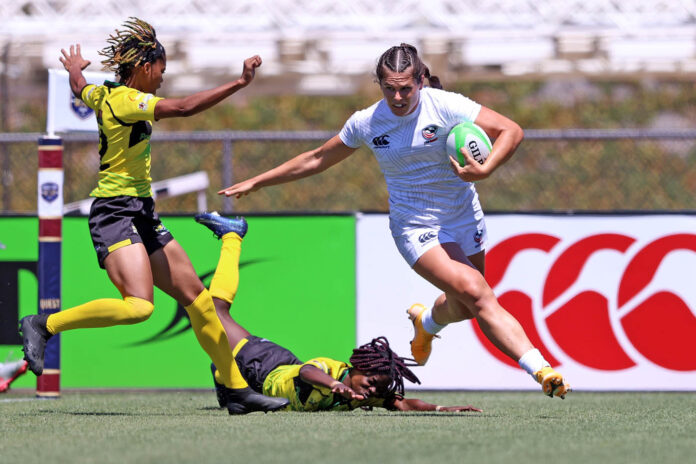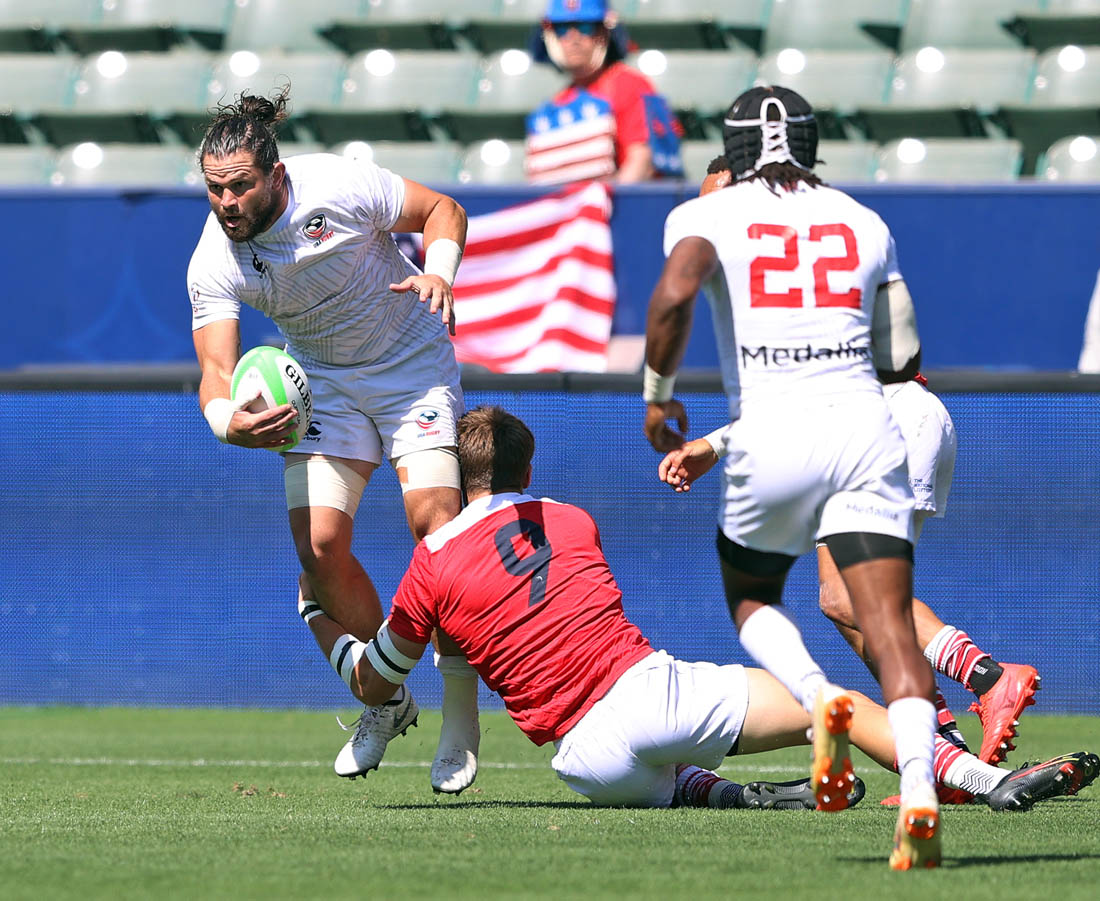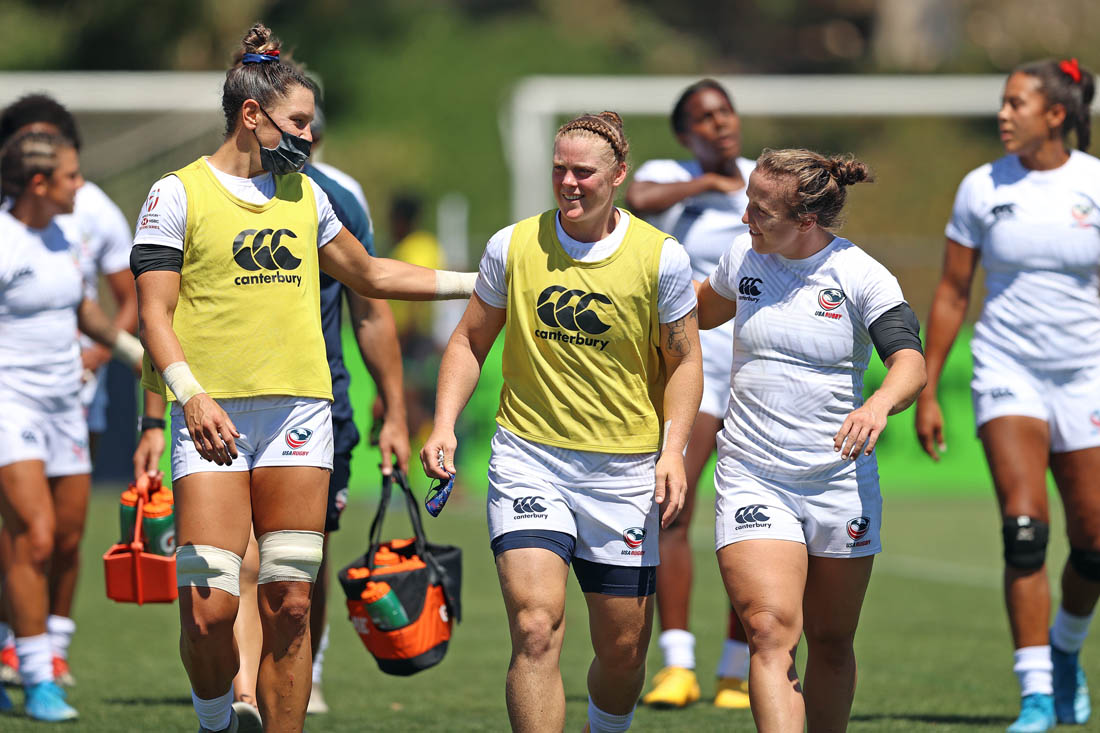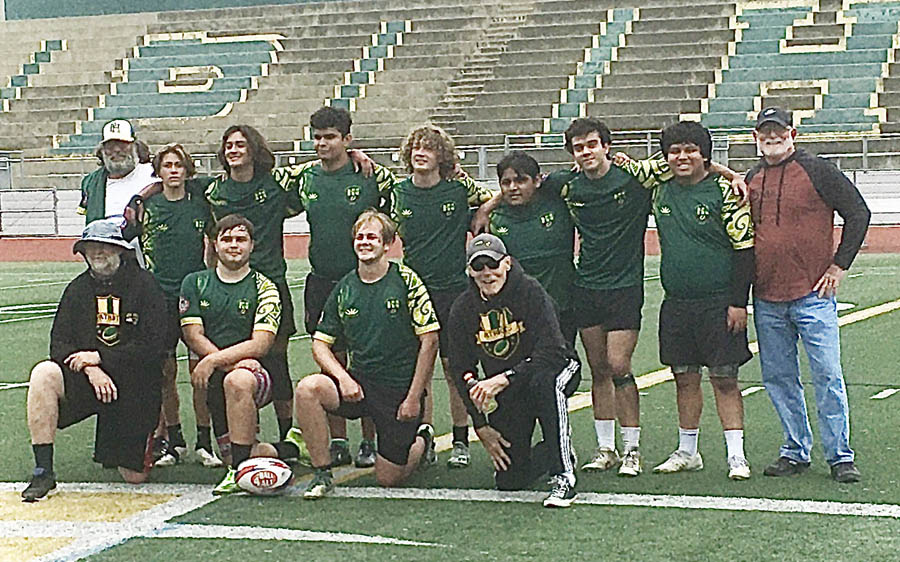
The United States rugby men’s and women’s sevens program is based at the Chula Vista Elite Athlete Training Center. While international competition was effectively shut down during the global COVID-19 pandemic, the rugby world seems ready to stand up and celebrate via the delayed 2020 Tokyo Olympic Games.
While the major quadrennial event has been delayed by a year, both American teams are hoping to make an impact at the international level that has traditionally been dominated by teams from the British Commonwealth.
The Olympic schedule features men’s competition from July 26-28, followed by women’s competition from July 29-31.
Round-robin play will take place in three groups that will feature 12 nations in each gender field.
Placement games and medal-round games follow the conclusion of round-robin play.
USA Rugby announced the women’s team it will be sending to Tokyo on June 17. The announcement of the men’s team followed on July 2.
The USA will face South Africa, Kenya and Ireland in Pool C in men’s play – the group is arguably one of the toughest in this year’s Olympic tournament.
South Africa finished runner-up to New Zealand in the 2020 HBSC World Rugby Sevens Series. The Americans finished seventh, followed by Ireland in 10th place and Kenya in 12th place.
Current rankings feature South Africa at No. 2, Kenya at No. 9 and the USA at No. 13.
The top two teams in each group advance to the quarterfinals.
The Americans have made significant progress since 2014 when head coach Mike Friday joined USA Rugby, leading the Eagles from near dead-last to statistically one of the top four nations in the world.
In 2019 — the final full season before the COVID-19 pandemic — the USA men won seven medals in 10 tournaments to hold the No. 1 world ranking until the final event when they finished second overall.
“This selection process has been incredibly competitive and that is a credit to the entire squad, especially off the back of what has been a hugely difficult year for the world,” e Friday said. “We’ve worked hard as a group to adapt and overcome all the adversities we’ve faced both individually and collectively. We look forward to representing the USA rugby community as we chase our spot on the podium.
“Our pool is being positioned by others as the pool of death and we recognize the magnitude of task in front of us with South Africa, Kenya and Ireland. As a squad, we are both determined to meet and rise to this challenge.
“The entire pack — both 15 selected for Tokyo and our greater residency squad — will push one another over the coming weeks to ensure we are fully ready to represent this country with pride.”
There is reason for optimism.

Seven of the 12 starters on the 15-man roster competed at the 2016 Rio Olympic Games in which the Americans narrowly missed qualifying for the medal rounds. The Tokyo-bound squad features a wealth of experience with athletes who have racked up many accolades over the years.
Four players have made more than 50 appearances in the HSBC World Rugby Sevens Series, including captain Madison Hughes, Danny Barrett, Carlin Isles and Folau Niua.
Isles is famously known as the fastest rugby player in the world and is the USA men’s all-time leading try scorer.
Barrett brings a notorious physicality and strength that has made him a household name while Niua is the most capped USA Sevens player of all time with 69 World Series tournaments.
In 2019 Niua was nominated as World Rugby Sevens Player of the Year alongside Stephen Tomasin, who will appear in his first Olympics this year.
The squad also features two-time Player of the Year Perry Baker (2018, 2019) who, alongside Isles, has more than 200 tries in the HBSC World Series event.
The USA women’s roster features 12 starters, one alternate and two traveling reserves — 10 of the 12 starters are first-time Olympians.
The USA women finished fifth at the 2016 Rio Games and captured the silver medal at the 2019 Pan Am Games in Lima, Peru.
Lauren Doyle and Alve Kelter both represented the United States in Rio. Kelter leads the squad in several statistical categories including tries, tackles and overall appearances in the HSBC World Rugby Sevens Series.

The U.S. women seem to be in a somewhat manageable Group C along with China, Japan and Australia. The American ladies finished fifth in the 2020 HBSC World Rugby Sevens Series. Australia finished runner-up to New Zealand while Japan ranked 11th and China ranked 13th.
Canada ranked third while France finished fourth in the standings.
“In the past month we’ve had our most competitive intra-squad scrimmages since I started with the program back in 2018,” USA women’s coach Chris Brown said. “All individual players contributed heavily and showed, if called upon, they could represent this wonderful country at the highest level well. This obviously made selection of the extended squad extremely tough but the unity we’ve shown for the past 18 months has been second to none.
“Although this announcement is exciting for many of our players, it’s devastating for a number of their closest teammates. I say this because it’s important to acknowledge that those going to Tokyo have a huge responsibility to represent the entire program, all our families and the United States of America.
“As a team, we have a great deal of strike power across the park. But looking at the increasing progress and competitiveness of the women’s game, we won’t be anywhere near winning a gold medal if we play as individuals as opposed to working as a group.
“That said, we have enough big match experience from the last three years to fully trust and believe that when we focus on the task at hand, play with discipline and fight as a collective, we are extremely hard to handle and we will be exactly where we need to reach the podium.
“Over the next few weeks, our emphasis in training will be to continue sharpening our defensive approach, focus on the opposition and connect our specific tools to challenge each of them.”
All USA rugby matches in Tokyo will be broadcast on NBC-TV’s complement of networks.
For player profiles, information about rugby, schedules, records and more, visit the official microsite for USA Rugby Sevens at tokyo.usa.rugby.
Update: USA men start Olympic tournament with 2-0 record
The Team USA men went 2-0 on Day One of rugby sevens at the Tokyo Olympics. After defeating Kenya with a try at the death, 19-14, the Eagles Sevens beat Ireland, 19-17, in another tight affair.
With the win, the USA will face South Africa at 11:30 a.m. Japan Time to determine its position in the medal rounds. The top two teams in each pool advance to the quarterfinals.
“I mean obviously it’s day one, so everybody wants to come out, performing their best and put their front foot forward and just be able to carry that momentum into Day Two,” first-time Olympian Matai Leuta said. “We have a few things we need to work on, but that’s with everything and we’ll, we’ll sharpen those tools and be ready for tomorrow.
“It’s the biggest stage in sports and so everybody’s bringing their a game. So we just have to be prepared to bring ours as well. Match the effort.”
“You know, it’s all about going into Day Two,” two-time Olympian Perry Baker said in advance of the pivotal game against South Africa. “We took care of the first few games, which was very important for us. So I feel good, no matter how we got the win.
“Just stick to the cohesion that we have, you know, that brotherhood like trusting each other, communicating; watch your film and see what game play we need to come up with for these guys.”
New Zealand, Great Britain and Fiji join the United States with 2-0 records following the opening day of competition. Australia and Argentina are both 2-1.
The Americans opened the match against Kenya with a 12-0 lead on tries from Carlin Isles and Martin Iosefu, but trailed 14-12 with less than a minute to play.
Madison Hughes scored the game-winning try for Team USA with 29 seconds remaining and teammate Stephen Tomasin added the ensuing conversion to nail down the victory.
Kenya entered the match ranked ahead of the United States.
“It’s great to get the win,” Hughes said. “I caught the ball, it looked a long, long way to the tryl-ine. And I know Kenya, you’ve got some fast guys, so it was amazing to fight through because at the end of the day, that’s what counts.
“Incredible work, great working, pushing them, putting them under pressure. And that was the difference in the match.
“I think we know that we’re contenders and we know that we can (beat) anyone, but every time we get on the pitch, we’ve got to prove that not only to ourselves, but to the rest of the world.”
“A lot of people don’t know about rugby, but America is one of the best in the world and we proved that a couple of years ago, we finished second in the world,” Isles said. “So the more. we do better, I think more people will get on to it because you can use your skill-set. There’s a position for everybody. You don’t have to specialize in just one thing; but your talent, whether you’re being fast, slow, whatever it is — you can be used. And that’s big.
“Just watching it, you love it. And I think for us, the more we do the better, the more people will be able to see, it’s already caught on and gradually got bigger as the years went on, especially from when I first started playing. So man, there’s no sport like it, I can tell you that much.”
Americans fall, 17-12, to South Africa, quarterfinals on tap next
The United States men’s Olympic rugby sevens team fell short of South Africa by a score of 17-12 in the teams’ final match of Pool C at the Tokyo Olympics. Team USA will next face Great Britain in the quarterfinals (Wednesday at 3 a.m. Pacific Time on NBCSN and NBCOlympics.com).
Should they win their next match, the Eagles Sevens will vie for a medal — either for the gold medal with a win or in the bronze medal game with a loss.
Winning the semifinal will put them in the Gold Medal game and losing places them in the Bronze Medal game.
Flash quotes from First-Time Olympian Brett Thompson and 2x Olympian Danny Barrett:
“It was a physical game and the rain is finally coming into play so it caused some issues with handling in general for both sides,” Team USA’s Brett Thompson said. “Unfortunately, we just didn’t adapt quick enough. Our goal was always to make the Cup quarters. Coming out of the pool and having that opportunity for the medal rounds, that’s really all we can ask because we’re using this experience as a stepping stone for success in the matches ahead.
“We also have to remember that, for this group, it’s probably like the sixth game — not even — that we’ve played together since the 2020 season ended early. So, we’re making huge improvements as we go and that’s a challenge we’ll have when we go against Team Great Britain next.”
Tuesday’s game took place in an empty stadium.
“It’s a massive, massive stadium and there’s no one in it,” Team USA’s Danny Barrett said. “But, once you get on the field, you can’t tell. I mean, it’s a bit clearer your communication player to player, timid teammates a lot clearer; but at the same time, there still are moments when you can’t hear things or you don’t see things in the right spot. Everything outside the white lines is out of our control. We’re here to compete, we’re here to win a medal. We got great Britain in the quarterfinal and we’d love to get one over on them.
“I just love the sport. I love the community. I love the people that are around it. The people back home cheering us on my family and friends waking up at two o’clock in the morning to do that. I live and breathe this. I just love it so much.”
Team USA falls to Great Britain, knocked out of medal rounds
After building a 21 point lead, the Team USA men fell to Great Britain , 26-21, in this year’s Tokyo Olympics quarterfinals on Tuesday. The result knocked the Americans out of the medal rounds. Team USA will face Canada in Wednesday’s fifth-place semifinal at 6 p.m. PT on NBCOlympics.com. Despite the loss, the Eagles Sevens have guaranteed their highest ever finish in an Olympic Games, having departed Rio 2016 in ninth place.
“We started really well, we took control of the game,” USA head coach Mike Friday said. “We had an opportunity, we just gifted back possession, seven points and that gave them hope. And they held onto that and they clawed themselves back into the game. You’ve got to give credit to them in terms of the durability.”
“As I said to the boys, results don’t define you as a man. They don’t define you as the individual. That’s just part of life. And I think as a group of men, with the way that they carried themselves and the way that they’ve represented this country themselves, hopefully will inspire young boys and young girls to take up the sport and aspire to be the next group that play in the Olympics.
“We’re hugely gutted. Sevens is brutal, right. Little moments, little referee calls either go your way or don’t go your way and that’s the difference between being in the medal rounds tomorrow. Unfortunately we’ve just fallen on the wrong side this evening. And we’re going to have to deal with that quickly because we have to come out tomorrow and represent the country once again and try and ensure that we finish as high as we can.”
“In America, that sporting landscape is about medals and winning. We understand that challenge, but it’s about inspiring as well. There’s a bigger picture here. It’s about encouraging the sport to be positioned in the high schools to compliment the super sports. So there’s another alternative to being that NFL player, that NBA player. It’s being an Olympian; taking up a game with great values and excelling.”
|
|

Patrick Henry sevens spotlight growth of high school rugby in the San Diego region
Rugby has recently gained a foothold in the Summer Olympic Games (as rugby sevens) and the United States men’s and women’s national teams have both qualified for the upcoming Tokyo Olympics.
The sport has been entrenched at the collegiate level for decades, now has a pro component in Major League Rugby, and has started to expand its roots at the youth level.
The sport has correspondingly started to filter into the high school ranks in recent years as a signal of that continued growth.
Patrick Henry High School boasted a winning club program this year as its boys sevens team finished 12-4 with the No. 4 ranking in the highly competitive Southern California region.
While rugby is not yet fully recognized as an official sport within the auspices of the California Interscholastic Federation, the sport is organized much like club soccer as a complement to official CIF sports.
Rugby sevens is an abbreviated version of the traditional rugby 15s game that most colleges and professional teams play. The sevens game, as its name suggests, features seven players on a side. It is a much faster contest with a wide-open attacking style of play on a full 100-yard football field.
The sevens game, like its parent fixture, features full-contact tackling, mauling (maintaining control of the ball and moving it towards, and sometimes into, the opposition in-goal area) and rucking (players competing for possession of the ball on the ground), no pads or helmets and two exhausting seven-minute halves.
The Southern California Youth Rugby organization fields programs at several levels. The season typically runs from November through February.
The Red Division serves 15s programs from the same school and is CIF-compliant with all students from the core school.
The White Division serves mixed schools, with a minimum of two-thirds of students from the core school.
The Gold Division serves programs fielding sevens teams, with all students from the core school.
Overall, there are approximately 25 teams currently representing section schools in all four corners of the county.
The Patrick Henry sevens are led by head coach Greg Chronopolos, an on-campus faculty member, assistant coaches Doug McDonald and Jon Hickey, OMBAC rugby legend Jim Dierker and players Aidan Bradley, Ethan Venegas, Walid Elassadd, Kevin Coffey, Alexis Vasquez, Cole Rugh, Marco Morante, Tyler Dempsey (captain), Levi Pritchard-Hickey and Ernesto Macias.
Champions for the 2021 spring season included Jaguars Rugby (High School Boys Sevens), Fallbrook (Open Girls U18 Sevens) and Belmont Shore Youth RC (Open Girls U15 Sevens).
Rugby 15s
The SoCal Interscholastic Rugby Federation, founded in 2017, includes two 15s divisions: Platinum and Gold. Founding teams included Cathedral Catholic, La Costa Canyon, Fallbrook, Mira Costa, St. Augustine, Saint John Bosco and Torrey Pines.
Cathedral Catholic finished as this year’s SCIRF champion.
The all-SCIRF team for 2020-21 includes Dylan Fortune, Luk Otineru, Carmine DeRosa and Nic Saldana from Cathedral Catholic High School, Lucca Rohrer, Chase Basson and Isaac Morrill from St Augustine High School, Christian Hunter and Van Graw from Mira Costa High School, Asa Valdivia and Joe Williamson from Coronado High School, Malcolm Durfee from La Costa Canyon High School, Dreyton Price from San Marcos High School, Hudson Nash from Fallbrook High School, Liam Kane from Mission Bay High School and Nathan Solano from Steele Canyon High School.
Otineru, who has received a scholarship to play rugby at St. Bonaventure University, was the SCIRF player of the year.
Cathedral Catholic finished 11th in the single-schools final national rankings while De La Salle led California teams at the No. 4 position.
Cathedral Catholic defeated St. Augustine, 22-11, in the 11th annual Rugby Holy Bowl on May 17. At the time, the Dons were ranked first in California and sixth in the nation.
St. Augustine finished ranked fourth in the state and 24th in the nation during the 2020-21 season.
San Marcos defeated first-year Steele Canyon, 47-20, to win the 2020 Gold Division title while Coronado defeated Granite Hills, 31-17, to capture third place.
Next level
The San Diego Legion crushed opponents to open the 2020 MLR season, blitzing its way to a 5-0 start with a plus-53 point-differential. But the Legion’s season ended there when MLR, along with virtually all professional and collegiate leagues, shut down because of the COVID-19 pandemic.
The Legion returned in 2021 in an expanded league but could not maintain its momentum by finishing the current season with a 6-10 record and out of the playoffs for the first time in three completed seasons.
The Legion finished runner-up to the Seattle Seawolves, 26-23, in the dying seconds of the league’s 2019 championship match at USD’s Torero Stadium.
The Legion played three matches this season at the Chula Vista Elite Training Center while being able to play two matches at USD.
Former Saintsman Ethan McVeigh, a 2018 alumnus and former high school player of the year, signed with the hometown Legion in early May.
Three Legion players — Siaosi “CC” Mahoni, Ryan Matyas and Psalm Wooching — were added to the USA 15s men’s national team extended 41-man roster in late May for July tests against England and Ireland. Thirty-one players, or roughly 75 percent of the roster, represent MLR clubs.
Legion coach Rob Hoadley was added as an assistant coach.
“A huge thank you to all the MLR clubs, not just for working with us as we select this group, but also in delivering a competitive training and competition environment that will help us get on the front foot in the short time we have ahead of facing England and Ireland,” USA Eagles head coach Gary Gold said. “We still have some work to do in terms of making final selections, but we are excited to see the final squad of 30 come together and to play some meaningful games this year.”
The top two teams in MLR’s Eastern Division (Rugby Atlanta and Rugby United New York) and Western Division (L.A. Gilitnis and Utah Warriors) will qualify for this year’s playoff semifinals July 24-25. The 2021 championship game will be played Aug. 1 between the semifinal winners.
Tokyo Olympics schedule
Men’s Rugby
July 26: USA vs. Kenya, USA vs. Ireland
July 27: USA vs. South Africa
Women’s Rugby
July 29: USA vs. China, USA vs. Japan
July 30: USA vs. Australia











